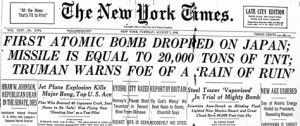I always felt badly that I had never read this classic book, that I was somehow not really an SF fan because of it. Eventually, guilt or shame brought it to the top of my in-pile, and I dove in. Now part of me wishes I had simply left it there.
The premise is that humanity of early 21st century is at war with a far-flung alien race. We’re not quite sure how it started, but it looks like they shot first. The only FTL is via some kind of wormhole, but there is plenty of slower-than-light travel to and from, and much of that travel is at relativistic speeds.
So, rather than leaving it as a pure space-navy war, we decide we need some boots on the ground. So who do we recruit as our cannon-fodder? Only the best and brightest will do. So we skim off the cream of our intellectual crop and send them off to battle. If only their commanding officers were as smart.
Which is leads me to the main complaint about this book. The people in charge were always extremely short-sighted and downright stupid. I recognize that to some extent this is a screed against the U.S. political/military leadership from the U.S.-Vietnam war, but it got really annoying as to just how stupid they were making these folks.
How stupid? Well, they planned their training with the expectation that half of the trainees would be killed or permanently maimed during the training. They also sent them on missions over the years (in fact, centuries) where the expectation was an average of 66% casualties per mission. But it’s not like we were stuck in the jungles, trying not to kill too many civilians. Nope, we were fighting over deserted rocks. What part of orbital bombardment did they miss?
And then there was the whole Malthusian situation back on Earth. I know there was a lot of concern about the rapid rise of population back in the 1970’s, but even growing up with that, I was never all that worried. The concern, as originally laid out by Thomas Malthus in the late 1700’s, was that our population would outstrip our food production, and that the only ways to combat this were draconian birth control of the less desirable or poorer populations or outright war and starvation to bring the population back down to a manageable level.
Some of offshoots of this back on Earth during the Forever War were an economy based entirely on calories. Then there were some civil wars and lawlessness that brought the population down. And then we had enforced and universal homosexuality. Maybe it’s because I now live in a world where most demographers realize we are not headed towards a Malthusian catastrophe, but frankly, I found most of this to be ridiculous.
Perhaps it’s unfair of me to lay these criticisms on Haldeman’s 1970’s book, but its repetitive message that our leaders are stupid and we are all doomed was very tiring. I prefer more optimistic futurists because instead of complaining about all the insurmountable problems facing us, they tend to propose the solutions that actually solve those problems.
And my final complaint about the book was that the resolution of the war was very much deus ex machina. After centuries, humanity transformed into another form that was able to communicate with the warmongering aliens. No, we can’t explain to you how the communication works, but now that it does, everything is just fine. The war was a silly misunderstanding, and now everyone can live happily ever after. We thank you for your centuries of pointless sacrifice.
About the only thing I did find worthwhile in the book was the realities of relativistic travel, of skipping forward into the future. Friends and family age and die. Technology and society march on in unexpected directions. The realities of life, death, and injury change from one trip to the next. That, at least, was interesting.
But by and large, I did not enjoy the book.






